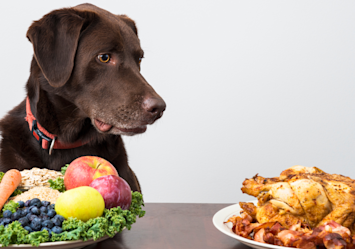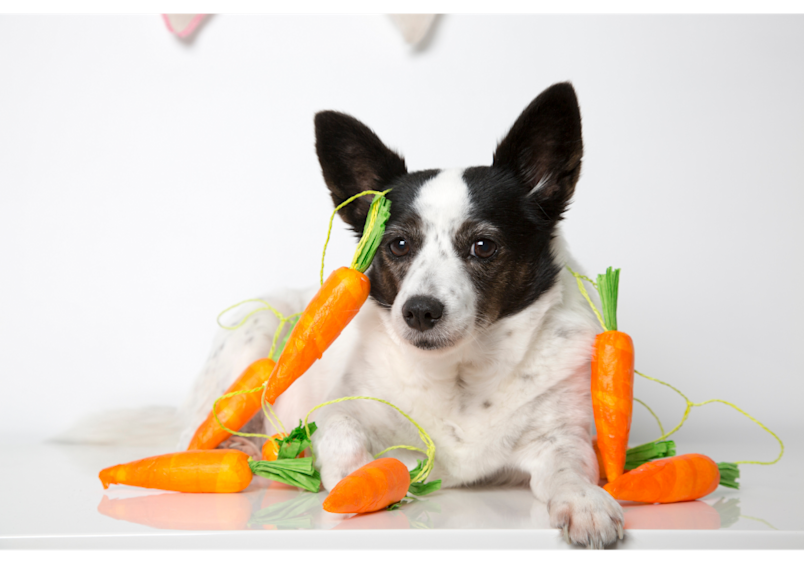
Your dog is more than a pet—they're family. They follow you from room to room, curl up beside you on the couch, and gaze longingly at your plate during dinner. And while it's tempting to share a bite of your meal with those pleading puppy eyes staring back at you, some human foods can be dangerous or even deadly for dogs.
So, what can dogs not eat? Let’s explore the foods dogs can't eat, why they’re harmful, and how you can keep your furry friend safe and healthy.
Why Can’t Dogs Eat Certain Human Foods?
Dogs and humans digest food differently. While we share many biological similarities, dogs lack the enzymes needed to break down certain compounds found in common human foods. When these substances build up in their system, they can cause anything from mild stomach upset to severe organ damage.
Toxicity also depends on your dog’s size, breed, and overall health. A small dog may react severely to a tiny amount of chocolate, while a larger dog might tolerate more—but that doesn’t mean it’s safe. When in doubt, always err on the side of caution.
What Can Dogs Not Eat?
Knowing which foods are harmful to dogs can prevent emergency vet visits and keep your furry friend safe. From everyday ingredients in your pantry to seemingly harmless treats, it's important to know which foods could hurt your pup.
Let’s break down the most dangerous foods for dogs and what makes them harmful.
Chocolate and Caffeine: It contains theobromine and caffeine, both of which stimulate the heart and central nervous system. Dogs metabolize these compounds slowly, making even small amounts risky. The darker the chocolate, the more toxic it is. Baking chocolate and dark chocolate contain higher levels of theobromine than milk chocolate.
Onions, Garlic, Leeks, and Chives: These flavorful ingredients contain N-propyl disulfide, which damages red blood cells and can lead to anemia.
Even powdered or cooked forms are dangerous. Always check ingredient labels, especially in soups, sauces, and seasonings.
Grapes and Raisins: Grapes and raisins contain tartaric acid, which can cause sudden kidney failure in dogs. The exact toxic dose varies, so it’s best to avoid them entirely.
Xylitol and Artificial Sweeteners: Xylitol is a sugar substitute found in gum, candy, baked goods, and even peanut butter. It causes a rapid insulin release in dogs, leading to hypoglycemia (low blood sugar) and potentially liver failure. Even small amounts can be life-threatening. Always check labels before sharing any treat.
Avocado persin: Persin is found in avocado leaves, skin, and pits. It can cause vomiting, diarrhea, and heart damage. While the flesh is less toxic, its high fat content may trigger pancreatitis.
Alcohol and Yeast Dough: It depresses the central nervous system and can cause organ damage. Yeast dough ferments in the stomach, producing ethanol and gas—leading to bloating and alcohol poisoning.
Macadamia Nuts: The exact toxin is unknown, but macadamia nuts can cause vomiting, fever, hind-limb weakness, and muscle tremors.
Cooked Bones and Fat Trimmings: Cooked bones can splinter, causing choking or internal injuries. Fat trimmings may lead to pancreatitis, a painful and potentially serious inflammation of the pancreas that can land your dog in the emergency room.
Harmful Vegetables and Fruits:
Green potatoes and tomatoes contain solanine, which can cause vomiting, dizziness, and seizures.
Rhubarb and leafy greens are high in oxalates, which may lead to kidney issues.
Oranges are safe in small amounts, but their acidity can upset your dog's stomach.
Even safe fruits and vegetables can be dangerous if you're not careful. Always take a moment to remove the peels, seeds, and pits, which can be choking hazards or contain harmful compounds. Serve them in small, easy-to-eat pieces and only as an occasional treat.

How to Spot Reactions to Foods Dogs Can't Eat
Recognizing the signs of food poisoning in dogs can be the difference between a close call and a tragedy. While symptoms can appear within minutes or take several hours to develop, knowing what to watch for helps you act quickly when every moment counts.
Symptoms vary depending on the food, but common signs include:
Vomiting or diarrhea
Lethargy or weakness
Loss of appetite
Abdominal pain
Incoordination
Excessive thirst or urination
Restlessness or hyperactivity
Muscle tremors
Pale gums
Collapse
Fever
Here’s a quick reference chart:
Food | Toxic Compound | Symptoms |
Chocolate | Theobromine, Caffeine | Vomiting, seizures, tremors |
Grapes/Raisins | Tartaric acid | Kidney failure, lethargy |
Xylitol | Artificial sweetener | Hypoglycemia, liver failure |
Onions/Garlic | N-propyl disulfide | Anemia, pale gums, collapse |
Avocados | Persin | Vomiting, diarrhea, heart damage |
Alcohol | Ethanol | CNS depression, organ damage |
Macadamia Nuts | Unknown toxin | Weakness, fever, tremors |
Green Potatoes | Solanine | Vomiting, dizziness, seizures |
Emergency Response for Foods Dogs Can't Eat
Act fast. If you suspect your dog has eaten something harmful:
Don't wait for symptoms. Call your veterinarian or an emergency animal clinic immediately.
Provide details. Share what your dog ate, how much, and when.
Follow professional advice. Your vet may recommend monitoring at home or urgent treatment.
When your dog eats something they shouldn't, every second counts. We all know emergency vet visits can be expensive, especially if your pup needs hospitalization, specialized care, or ongoing treatment. You should never have to check your bank balance before calling your vet. Thankfully, having pet insurance already in place means you can focus on what matters most: your dog's recovery, not the cost!
Dog health insurance can help you with emergency visits, diagnostic tests, medications, and even specialist referrals. Whether it's a late-night rush to the emergency clinic or a multi-day hospital stay, being prepared with proper coverage helps you act quickly and confidently, ensuring your dog gets the best possible care without the added stress of unexpected veterinary bills.
Consider adding on an optional wellness plan to help budget for preventive care to avoid emergencies in the first place. Your vet can walk you through all the safe and dangerous foods for dogs and help keep your pup healthy.
What Human Foods Can Dogs Eat Safely?
While it's important to know what dangerous foods to avoid, it's worth noting that many human foods are perfectly safe and nutritious for dogs. Some healthy options include carrots, apples (without seeds), plain cooked chicken, blueberries, sweet potatoes, and pumpkin. These foods can provide valuable vitamins and minerals when given in moderation.
Remember to introduce any new food slowly and in small amounts, watching for signs of intolerance over the next 24-48 hours. Treats and human foods should make up no more than 10% of your dog's daily diet.

Keeping Your Dog Safe from Foods Dogs Can't Eat
So, what can dogs not eat? From chocolate and grapes to onions and xylitol, the list of toxic foods is longer than most pet parents realize. But with a little knowledge and consistent habits, you can keep your dog safe from harm. Prevention starts with simple steps:
Store toxic foods in high cabinets or locked containers
Educate your household about what foods are off-limits
Clean up promptly after meals
Keep dog-safe treats nearby to satisfy begging behavior
Use puzzle toys or chew treats during mealtime to keep your dog occupied
Even a dropped grape or chocolate chip can be dangerous, so staying vigilant and being ready to act in case of emergency is essential. Your dog depends on you to make smart choices, and with Pet Insurance by your side, you'll have the support you need to navigate life's unexpected moments—so you and your pup can enjoy every tail-wagging adventure ahead!